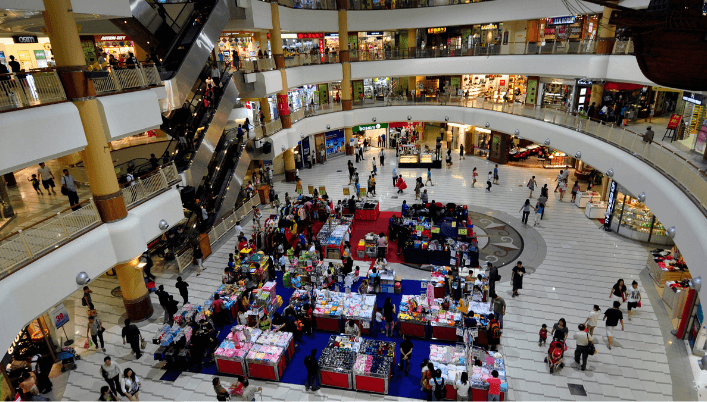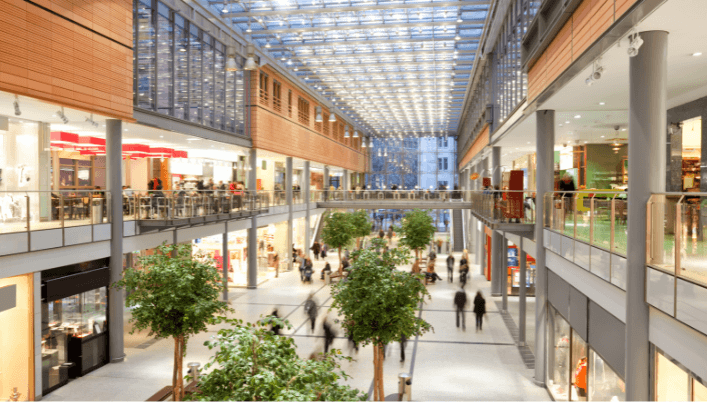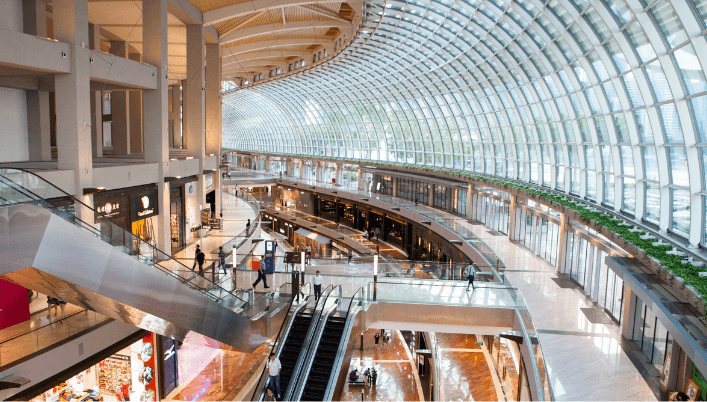
Embark on a captivating journey through the world of retail property – where commerce and community converge.
Discover Singapore’s diverse retail market, a vibrant mix of local gems and global brands that shape the economy and culture. Uncover the secrets of successful retail: crafting engaging spaces, embracing technology, and fostering memorable experiences.
Join us in exploring the dynamic blend of traditional storefronts and cutting-edge innovations, where every corner holds the promise of discovery and every decision shapes the future.
Key Takeaways
- Retail Property Definition: Retail property encompasses commercial spaces, such as shopping malls and street-front stores, dedicated to selling goods and services to consumers.
- Vital Role in Economy: The dynamic retail market in Singapore contributes significantly to the country’s economy, offering a diverse range of local and global brands and generating employment opportunities.
- Economic Growth Driver: Retail property stimulates economic growth by boosting consumer spending and attracting investments, fostering innovation, and enhancing different areas of Singapore.
- Consumer Analysis: To thrive, retailers should understand consumer preferences and purchasing behaviors, adapting offerings to create memorable shopping experiences.
- Online vs. Offline Shopping: The rise of e-commerce has transformed retail, necessitating adaptation to online and offline shopping trends while emphasizing unique in-store experiences.
- Technology’s Impact: Embracing technology is crucial for retail property success, enhancing operations and customer interactions, thus elevating the retail experience.
- Investment Returns: Retail properties offer appealing returns through stable cash flow and potential capital appreciation, making them attractive for investors.
- Investment Factors: Strategic investing involves assessing the location, market demand, tenant mix, rental potential, and overall market conditions, guided by thorough research.
- Returns and Risks: Retail investments yield returns through rental income, capital appreciation, or both, but careful evaluation of risks and returns is essential.
- Property Types: Retail spaces come in various forms, such as malls, shopping centers, and street-front stores, each with unique features and considerations.
Introduction to Retail Property: Defining the Scope and Importance

Definition of Retail Property
Retail property refers to commercial properties used for the sale and provision of goods and services to consumers.
These properties include shopping malls, shopping centers, street-front stores, and other retail spaces.
Understanding the Retail Market in Singapore
The retail market in Singapore is dynamic and diverse.
It caters to a wide range of consumer preferences, offering a mix of local and global brands.
The retail sector contributes significantly to the country’s economy and provides employment opportunities for many individuals.
The Role of Retail Property in Driving Economic Growth
Retail property plays a crucial role in driving economic growth by stimulating consumer spending and attracting investments.
It creates a vibrant retail ecosystem and fosters entrepreneurship and innovation.
The development of retail properties in strategic locations contributes to the overall development and attractiveness of different areas in Singapore.
Retail Property Market Analysis: Understanding Consumer Behavior and Trends

Analyzing Consumer Preferences and Shopping Habits
To succeed in the retail market, it is essential to analyze consumer preferences and shopping habits.
Understanding what drives consumers to make purchasing decisions can help retailers tailor their offerings and create memorable retail experiences.
Trends in the Retail Market: Online vs. Offline Shopping
The retail market has experienced significant changes due to the rise of e-commerce.
Consumers now have the option to shop online or offline, and it is important for businesses to adapt to these trends.
However, traditional brick-and-mortar stores still hold value, as they offer personalized experiences and immediate product satisfaction.
The Impact of Technology on Retail Property
Technology has transformed the retail landscape, shaping the way businesses operate and interact with consumers.
Retail property owners and developers need to embrace these advancements to provide innovative solutions and enhance the overall retail experience.
Commercial Property Investment: Unlocking Opportunities in the Retail Sector

Why Invest in Commercial Retail Properties?
Investing in commercial retail properties can offer attractive returns and long-term growth opportunities.
Retail properties often provide stable cash flow and potential for capital appreciation, making them an appealing investment choice for investors.
Factors to Consider When Investing in Retail Property in Singapore
When considering investing in retail property in Singapore, several factors should be taken into account.
These include location, market demand, tenant mix, rental potential, and overall market conditions.
Conducting thorough market research and seeking professional advice can help investors make informed investment decisions.
Returns on Investment in the Retail Sector
The retail sector offers various types of investment opportunities, each with its own risk and return profile.
Returns on investment in retail properties can be derived from rental income, capital appreciation, or a combination of both.
It is important for investors to assess the potential returns and evaluate the risks associated with their investment strategies.
Exploring Retail Space: A Closer Look at Different Types of Retail Properties

Types of Retail Properties: Malls, Shopping Centers, and Street-Front Stores
Retail properties come in different forms, including malls, shopping centers, and street-front stores.
Each type has its own unique features and considerations.
Malls and shopping centers provide a wide range of retail options and attract high foot traffic, while street-front stores offer visibility and convenience to consumers.
Key Features and Considerations for Different Retail Property Types
When leasing or managing retail spaces, it is important to consider the specific features and requirements of each property type.
Factors such as size, location, amenities, and target audience should be taken into account to ensure the success and profitability of retail businesses.
Leasing and Managing Retail Spaces
Leasing and managing retail spaces require careful planning and attention to detail.
Property owners and managers should establish clear leasing terms, maintain attractive and well-maintained spaces, and provide support to tenants to create a thriving retail environment.
Retail Property in Business Districts: Impact on Growth and Success
The Significance of Retail Property in Business Districts
Retail property plays a crucial role in business districts, contributing to the overall success and growth of these areas.
Business districts often attract high foot traffic and offer a mix of retail, office, and residential spaces, creating a vibrant and dynamic environment.
Advantages and Challenges of Operating Retail Businesses in Business Districts
Operating retail businesses in business districts presents both advantages and challenges.
On the one hand, businesses can benefit from the large customer base and exposure to corporate clients.
On the other hand, high rental costs and competition may pose challenges to retailers in these prime locations.
Strategies for Success in Business District Retail Properties
To succeed in business district retail properties, retailers need to adopt effective strategies that differentiate themselves from competitors.
This may include creating unique shopping experiences, offering exceptional customer service, and leveraging technology to enhance operations and customer engagement.
The Evolution of Shopping Centers: From Indoor Malls to Innovative Retail Ecosystems

Retail property management has undergone significant transformations over the years, evolving from traditional indoor malls to innovative retail ecosystems.
This shift in approach has been driven by various factors such as changing consumer preferences, advances in technology, and the need for retail spaces to adapt to the demands of the modern market.
Retail Property Management: Strategies for Maximizing Asset Value
Effective management strategies are essential for maximizing the value of retail properties.
One key aspect of property management is ensuring proper maintenance and upkeep.
This involves regular inspections, repairs, and maintenance activities to ensure the property remains in optimal condition.
By implementing effective maintenance techniques, property owners can extend the lifespan of their assets and enhance their appeal to tenants.
Promoting tenant satisfaction and retention is another crucial aspect of retail property management.
Real estate managers need to foster strong relationships with tenants and address their concerns promptly.
This can be achieved through clear communication channels, proactive problem-solving, and offering attractive lease terms.
Satisfied tenants are more likely to renew their leases, reducing turnover rates and ensuring consistent revenue for the property owner.
Implementing sustainable practices is also vital for the long-term success of retail properties.
Energy-efficient systems, waste management initiatives, and environmentally friendly design can help reduce operating costs and attract environmentally conscious tenants.
By integrating sustainable practices, retail property owners can demonstrate their commitment to corporate social responsibility and differentiate themselves in the market.
Retail Property Listings and Sales: Navigating the Buying and Selling Process
When it comes to buying and selling retail properties, understanding market trends and pricing is essential.
Real estate professionals need to stay updated on the latest market data, including property values, rental rates, and vacancy rates.
This information enables them to make informed decisions and negotiate favorable deals.
Working with a real estate agent who specializes in retail properties can greatly simplify the buying and selling process.
These professionals have expertise in the market and can help buyers find the right property that meets their needs and budget.
Similarly, they can assist sellers in marketing their properties effectively and identifying potential buyers.
Negotiating the sale of a retail property requires skill and knowledge of the market.
Real estate agents can help sellers navigate the negotiation process, ensuring they receive the best possible price for their property.
They can also assist buyers in negotiating favorable terms and conditions, maximizing their investment.
Innovative Retail Spaces: Co-Working and Community Concepts in Retail
The rise of co-working spaces within retail environments has revolutionized the concept of traditional retail spaces.
By incorporating co-working areas, retail properties can attract a diverse range of tenants and foster collaboration and creativity.
Co-working spaces offer flexible work arrangements, networking opportunities, and shared amenities, making them attractive to entrepreneurs, freelancers, and small business owners.
Fostering community engagement and collaboration is a key advantage of incorporating co-working spaces in retail.
These areas provide platforms for individuals to connect, share ideas, and collaborate on projects.
By creating a sense of community, retail properties can enhance the overall experience for tenants and visitors, leading to increased foot traffic and customer loyalty.
However, incorporating co-working spaces in retail also poses certain challenges.
Property owners need to carefully manage the balance between retail and co-working areas to ensure both types of tenants coexist harmoniously.
Additionally, considerations such as noise control, privacy, and security need to be addressed to create a conducive and safe working environment.
Retail Property and Urban Development: Transforming Spaces for Vibrant Communities
Transforming retail properties to serve as vibrant hubs within communities is a key trend in urban development.
Revitalizing older retail properties for modern needs is one way to achieve this.
By repurposing vacant or underutilized spaces, property owners can breathe new life into the area while preserving its heritage and character.
Creating mixed-use developments is another approach to maximize the potential of retail properties.
These developments combine residential, commercial, and recreational spaces, catering to the diverse needs of the population.
By providing a range of amenities within close proximity, mixed-use developments create vibrant communities where residents can live, work, and play.
However, balancing economic growth with sustainable urban planning is crucial when it comes to retail property and urban development.
Property owners and developers need to consider factors such as traffic congestion, environmental impact, and social inclusivity.
By implementing sustainable practices and engaging in community consultation, retail properties can contribute to the creation of vibrant and livable cities.
Retail Property Investment Insights: Data-Driven Approaches to Decision-Making
Retail property investment requires strategic decision-making backed by data-driven approaches.
Analyzing data is crucial in understanding market trends, identifying potential opportunities, and mitigating risks.
By utilizing data analysis techniques, investors can gain insights into consumer behavior, regional preferences, and market demands.
Market research plays a fundamental role in retail property investment.
Conducting thorough market research helps identify suitable locations, assess competition, and understand consumer demographics.
This analysis aids in making informed investment decisions and optimizing profitability.
Demographic data is a valuable resource for retail property investors.
It provides insights into the target audience’s age, income levels, preferences, and buying habits.
By analyzing demographic data, investors can tailor their offerings and marketing strategies to effectively reach their desired customers.
Retailer and Tenant Strategies: Enhancing Customer Experiences and Profits
Creating a seamless customer experience journey is essential for retailers and tenants in retail properties.
From the moment a customer enters a shopping center or retail space, they should feel welcomed and engaged.
This can be achieved through well-designed layouts, attractive displays, and attentive staff who prioritize customer satisfaction.
The tenant mix within a retail property plays a significant role in its profitability.
A carefully curated selection of tenants can attract a diverse customer base and increase foot traffic.
Retail property owners should consider a mix of established brands, niche retailers, and local businesses to create a vibrant and appealing environment.
Innovation is key in the retail industry, and retailers should continuously explore new strategies for customer engagement.
This can include interactive displays, experiential marketing, and personalized shopping experiences.
By embracing innovative retail strategies, retailers can differentiate themselves from competitors and forge strong connections with their target audience.
Global Retail Property Trends: Lessons and Inspirations from Around the World
Emerging retail markets present great potential for growth and investment opportunities.
As economies develop, consumer spending power increases, driving the demand for retail spaces.
Retail property investors should stay updated on global retail trends and identify emerging markets with favorable growth prospects.
Incorporating sustainable practices in retail property development is becoming increasingly important.
Consumers are more conscious of environmental issues, and retail properties that prioritize sustainable design and operations can attract environmentally-aware customers.
Implementing green spaces, energy-efficient systems, and eco-friendly initiatives can contribute to a positive brand image and long-term sustainability.
The retail industry is constantly evolving with technological advancements.
From augmented reality shopping experiences to digital payment solutions, technology is shaping the way retailers operate.
Investors in retail property should embrace these advancements and consider incorporating technology-driven elements into their properties to enhance customer experiences and stay ahead of the competition.
Advisory Services for Retail Property: Tailored Solutions for Success
Retail property advisory services provide valuable guidance and expertise to investors and asset owners.
These professionals have in-depth knowledge of the retail property sector and can offer strategic advice tailored to individual needs.
From market analysis to property selection, retail property consultants assist in maximizing return on investment.
Retail property consultants play a crucial role in transactional processes.
They provide insights into market trends, property valuation, and negotiation strategies.
With their expertise, asset owners can navigate complex real estate transactions and make informed decisions to optimize their retail property investments.
Tailored solutions are essential for retail property asset owners.
Whether it’s identifying suitable tenants, optimizing space utilization, or enhancing property value, retail property consultants can provide customized strategies tailored to the specific goals and challenges of each asset owner.
The Future of Retail Property: Embracing Change and Seizing New Opportunities

Adapting to changing consumer preferences is crucial in the retail property industry.
Retailers and property owners must stay attuned to evolving trends and meet the expectations of modern consumers.
This may involve incorporating online shopping options, integrating technology into physical stores, or providing personalized experiences to cater to individual customer needs.
Retail property designs are evolving to create unique and engaging spaces.
From mixed-use developments to experiential concepts, modern retail properties aim to provide more than just shopping experiences.
Incorporating leisure areas, entertainment facilities, and community spaces can attract customers and create an inclusive environment.
Technology is a powerful tool that can enhance retail property experiences.
Advancements in artificial intelligence, data analytics, and smart systems can revolutionize how retail spaces operate.
From personalized recommendations to seamless checkout processes, technology can streamline operations and create memorable experiences for customers.
Conclusion
In the captivating world of retail property, the landscape is ever-evolving, promising an exciting journey through innovation and adaptability.
Prepare to embark on a venture that delves into the heart of retail property, where every corner holds a treasure trove of insights waiting to be discovered.
Picture a realm where retail properties transcend their traditional roles, embracing co-working spaces that buzz with entrepreneurial energy.
Witness the transformation of urban centers into vibrant communities, where the pulse of modern life intertwines seamlessly with the echoes of the past.
This is a realm where data-driven decisions illuminate the path to success, ensuring that every step taken is grounded in strategic foresight.
As we navigate the complexities of retail property investment, you will uncover the art of curating tenant mixes that breathe life into spaces, and delve into the enchanting realm of experiential retail, where technology paints immersive landscapes that captivate and engage.
Amidst the ever-changing currents of the global retail tide, our compass is set on sustainability, where eco-conscious practices intertwine with profitability.
The future beckons with promises of seamless integration between the digital and physical realms, where technology augments human experiences, and retail properties become stages for unforgettable moments.
Join us as we unravel the tapestry of retail property, where each thread weaves a story of growth, transformation, and boundless potential.
Get ready to embark on a journey that will forever change the way you perceive the world of retail property.
Welcome to a new era of possibilities.
Frequently Asked Questions
What is the definition of retail property?
Retail property refers to commercial spaces or buildings that are specifically designed for retail businesses.
These spaces are often used for selling goods or services directly to consumers.
How can I view retail properties for sale?
To view retail properties for sale, you can visit real estate websites, contact local real estate agents, or attend property exhibitions or auctions.
What is a retail building?
A retail building is a commercial property that is designed or used for retail purposes.
It typically includes spaces for shops, malls, shopping centers, or other retail establishments.
Who is involved in managing retail properties?
Retail properties are managed by a team of professionals who specialize in real estate management.
This team may include property managers, leasing agents, maintenance staff, and other relevant personnel.
Where can I find the latest retail property report?
You can find the latest retail property report on industry-related websites, market research firms, or by subscribing to newsletters or publications that focus on the retail real estate market.
What are the factors to consider when investing in retail properties?
When investing in retail properties, it is important to consider factors such as location, foot traffic, market trends, competition, and potential return on investment.
What is the role of an investor in the retail property market?
An investor in the retail property market typically purchases retail properties with the intention of generating income through renting or leasing the space to retail businesses.
What are the types of retail spaces available?
There is a wide range of retail spaces available, including shop spaces, shopping centers, boutique spaces, event spaces, gallery spaces, and more.
The selection of spaces depends on specific business needs and budget.
Who are some key players in the retail property market?
Some key players in the retail property market include Frasers Property, Straits Retail Property Management Services Pte Ltd, and other real estate developers and management companies.
Can retail properties be used for purposes other than retail businesses?
Yes, retail properties can be repurposed for other uses such as office spaces, restaurants, or entertainment venues.
However, it is important to ensure that the property is suitable for the intended purpose and complies with local zoning regulations.












